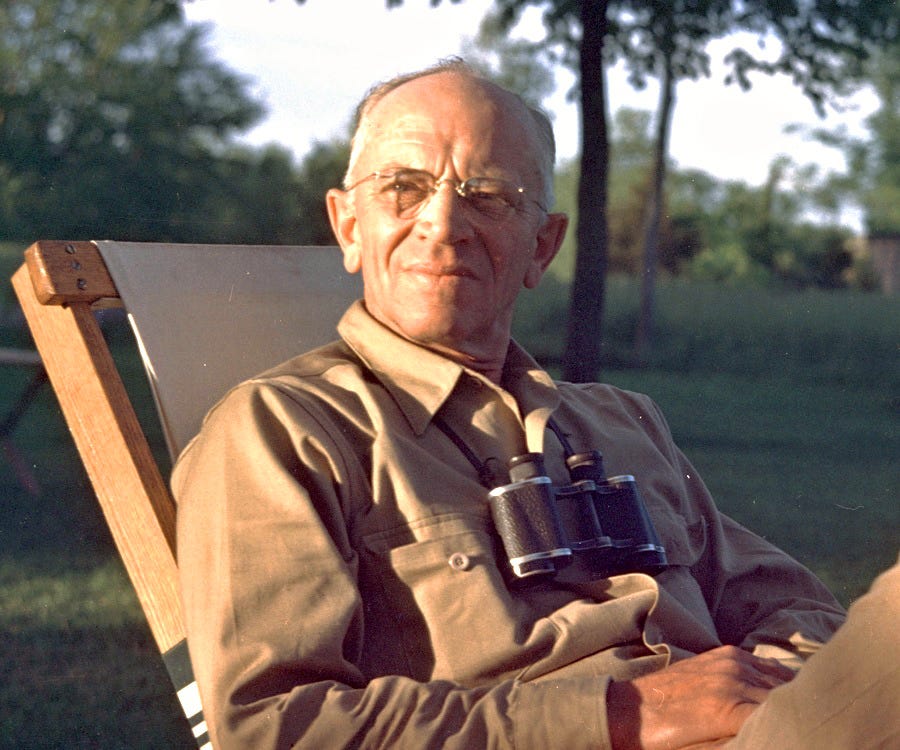Aldo Leopold: The Father of the Land Ethic
The second installment of the series: Trailblazers - Legends of the Outdoors
"There are some who can live without wild things and some who cannot.”- Aldo Leopold.
If you’ve ever walked through a Wisconsin forest, listened to the call of a sandhill crane, or watched the seasons unfold in a quiet meadow, you’ve felt the legacy of Aldo Leopold. Often called the "father of wildlife ecology" and one of the most influential conservationists of the 20th century, Leopold changed the way we think about our relationship with nature. His work laid the foundation for modern conservation, and his writings continue to inspire those who seek a deeper connection to the land.
A Life Rooted in Conservation
Born in 1887, Leopold’s passion for the natural world took root in his early years exploring the outdoors in Iowa. He went on to become a forester, ecologist, and professor, but it was in Wisconsin where his ideas fully flourished. In 1935, Leopold and his family purchased a worn-out farm near Baraboo along the Wisconsin River. On that patch of land, now known as the Aldo Leopold Farm and Shack, a National Historic Landmark, he observed, experimented, and wrote about the complex relationships between humans and the environment.
Leopold's time at the Shack was transformative. He and his family worked to restore the depleted soil, plant trees, and encourage the return of wildlife. These experiences shaped his most famous work, A Sand County Almanac, a collection of essays that blends philosophy, science, and personal reflection.
Photo Courtesy of the Aldo Leopold Foundation and University of Wisconsin-Madison Archives
The Land Ethic: A Revolutionary Idea
Leopold’s most enduring contribution to conservation is his concept of the Land Ethic. He argued that humans are not separate from nature but rather part of an interconnected community that includes soil, water, plants, and animals. “A thing is right,” he wrote, “when it tends to preserve the integrity, stability, and beauty of the biotic community. It is wrong when it tends otherwise.”
This idea challenged the prevailing notion that land was merely a resource for human use. Instead, Leopold proposed that we have a moral responsibility to care for and respect the land, just as we do for one another. His philosophy laid the groundwork for environmental ethics in such a fundamental way that it is hard to imagine a time where the concept felt novel. This philosophy continues to influence conservation policies today.
A Lasting Legacy
Though Leopold passed away in 1948, his influence endures. His work helped shape modern wildlife management, wilderness preservation, and ecological restoration. The Aldo Leopold Foundation, based at his beloved Shack, continues to educate and advocate for land stewardship.
For those who find solace in wild places, Leopold’s words still ring true. His philosophy reminds us that conservation is not just about protecting land—it’s about fostering a deep, ethical relationship with it. Next time you step onto a trail, take a moment to consider the unseen forces at work: the slow growth of trees, the movement of water through soil, the quiet presence of wildlife. In doing so, you honor the legacy of Aldo Leopold and the land ethic he so passionately championed.





One of my favorite quotes: “when we see land as a community we belong to, we may begin to use it with love and respect.”
Wonderful tribute. My hope with my own Substack is to help increase people's land ethic (and water ethic, as I'm in Florida and we have such imperiled springs and waterways).
Thank you for writing!